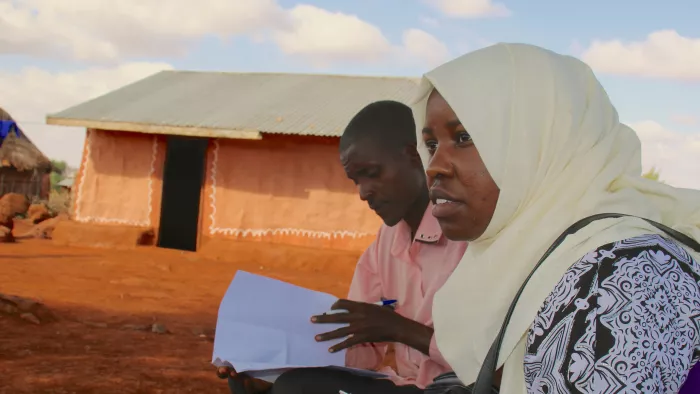
Phòng thí nghiệm đổi mới DEPP
The Disasters and Emergencies Preparedness Programme (DEPP) Innovation Labs created a diverse network of national and international humanitarian organisations, to identify and grow areas of innovation that come directly from communities affected by crises.
Về chương trình
The DEPP Innovation Labs supported local-level innovation to strengthen disaster preparedness. The programme aimed to build solutions with communities at risk of crises to reduce the risk they face and to protect lives.
The Labs are based in Bangladesh, Jordan, Kenya, Philippines. The programme was supported through a two-year £10 million grant from UK Aid and was jointly managed by Start Network and CDAC Network. The labs and the innovations they supported are seeking continued funding to enable the innovations to scale and continue work.
Tài nguyên chính
During the two years of the programme the Labs, innovations and programme management team created a number of resources for organisations and Labs supporting humanitarian innovation. Here are a few key resources.
How the labs work
The labs work to build inclusive, entrepreneurial environments and partnerships. They offer skills training, business mentoring, financial support and the necessary infrastructure to turn ideas into viable, scalable solutions to protect lives.
The supported innovations cover a broad range of areas such as early warning communication systems, disaster awareness education tools, protective flood barriers, agricultural tech applications to counter the effects of drought and transport and accommodation solutions for refugees.
Established in Bangladesh, Jordan, Kenya, and the Philippines, all disaster-prone countries, DEPP Innovation Labs seek to tackle specific challenges identified by communities at risk. All the innovation labs follow a user-centred design process to create local-level solutions that work for and with vulnerable people.
The five-stage model for innovation
Multiple models for developing innovation exist. DEPP Labs' activities generally follow a five-stage process. Read about DEPP Labs five-stage innovation process here.
The labs
Phòng thí nghiệm đổi mới cộng đồng an toàn hơn ở Bangladesh
The Bangladesh Lab aims to examine and improve the direct impact of the built environment on emergencies. The lab seeks to find and support ideas that build safer communities and being based out of Korail, Bangladesh’s largest slum, it will ensure ideas are led by the local community. The lab is hosted by Dhaka Community Hospital Trust, a Bangladeshi community hospital and medical college and a consortium of partners.
Các đối tác của tập đoàn ở Bangladesh bao gồm Dịch vụ kỹ thuật SEEDS; Đại học New South Wales; Trung tâm Nghiên cứu Dịch tễ học Thảm họa (CRED); và Mạng lưới ứng phó và giảm thiểu thảm họa châu Á, một mạng lưới xã hội dân sự gồm 56 tổ chức phi chính phủ quốc gia từ khắp khu vực châu Á.
Phòng thí nghiệm TUKLAS ở Philippines
TUKLAS Innovation Labs, a community-centered innovation project, welcomes Filipinos from all walks of life to submit ideas to better prepare communities for disasters, including ideas to address the impacts of disease outbreaks and armed conflict. Tuklas means “discover” in Tagalog and the acronym TUKLAS Tungo sa Kahandaan ng Pilipinas means “Towards Preparedness in the Philippines”.
Consortium partners: Plan International, Citizen Disasters Response Center, CARE and Action Against Hunger
Read more about the TUKLAS Labs.
Phòng thí nghiệm đổi mới AIM ở Kenya
Adeso, iHub and Mastercard (AIM) Labs, known as the Maarifa Kona, are partnering in Kenya to strengthen rural communities’ resilience to recurring drought – to enable them to prepare, respond and recover. The AIM consortium uses a human-centred approach to innovation by working hand in hand with local communities in the counties of Marsabit and Garissa.
Phòng thí nghiệm Mahali ở Jordan
Mahali Lab, run by International Rescue Committee, is set up to identify and solve challenges posed by long-term displacement of people, caused primarily by the war in Syria. A series of “design challenges” will enable communities to propose potential solutions to problems faced by vulnerable communities throughout Jordan. The theme of each challenge is determined through consultation with Syrian refugees, leaders within host communities, and community-based organisations. A community review board selects a small number of innovators to receive specialised support to fully develop their solutions. The IRC will invest in and support the most promising projects.
The Mahali Lab is managed by the Airbel Center, the innovation unit at the IRC. More information is on Cứu hộ.org và Trung bình.
The labs in action
Những đổi mới
The projects supported through the labs cover agribusiness, pharmaceutical solutions, tech platforms for disaster management, low-cost housing, early warning devices and disaster education tools.
Read more about DEPP Labs innovations.
